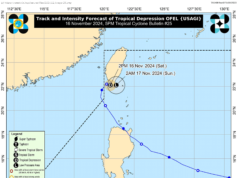The U. S. Transportation Department began an investigation of how Boeing Co.’s 737 Max was certified to fly passengers before the latest crash in…
The U. S. Transportation Department began an investigation of how Boeing Co.’s 737 Max was certified to fly passengers before the latest crash in Ethiopia involving the new jet, according to a person familiar with the probe.
The investigation was prompted by information obtained after a Lion Air 737 Max 8 crashed shortly after takeoff from Jakarta on Oct. 29, said the person, who wasn’t authorized to speak about the investigation and asked not to be named.
The investigation has taken on new urgency after the March 10 crash of an Ethiopian Airlines 737 Max 8 near Addis Ababa that killed 157 people. It is being conducted in part by the department’s Inspector General’s office, which conducts both audits and criminal investigations in conjunction with the Justice Department.
Boeing shares were down 2.6 percent to $369.22 at 12:44 p.m. March 18 in New York, heading toward a new low since the deadly crash of Ethiopian Airlines Flight 302 on March 10.
Separately, the Wall Street Journal reported that a grand jury in Washington, D. C., on March 11 issued a subpoena to at least one person involved in the development process of the Max. And a Seattle Times investigation found that U. S. regulators delegated much of the plane’s safety assessment to Boeing and that the company, in turn, delivered an analysis with crucial flaws. Ethiopia’s transport minister said March 17 that flight-data recorders showed “clear similarities” between the crashes of that plane and Lion Air Flight 610 last October.
A possible criminal investigation during an aircraft accident investigation is highly unusual. While airline accidents have at times raised criminal issues, such as after the 1996 crash of a ValuJet plane in the Florida Everglades, such cases are the exception.
U. S. Federal Aviation Administration employees warned seven years ago that Boeing had too much sway over safety approvals of new aircraft, prompting an investigation by Transportation Department auditors who confirmed the agency hadn’t done enough to “hold Boeing accountable.”
The 2012 investigation also found that discord over Boeing’s treatment had created a “negative work environment” among FAA employees who approve new and modified aircraft designs, with many of them saying they’d faced retaliation for speaking up.






